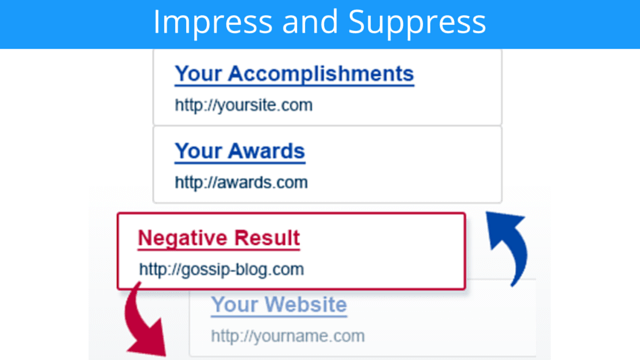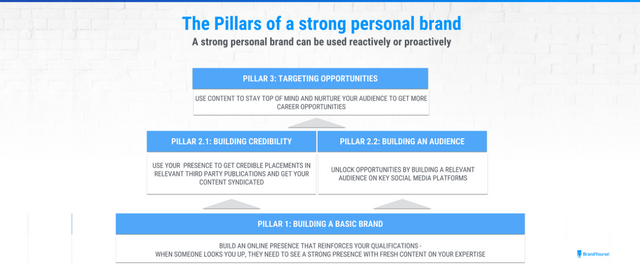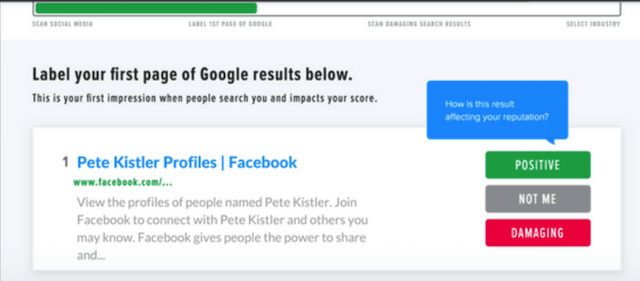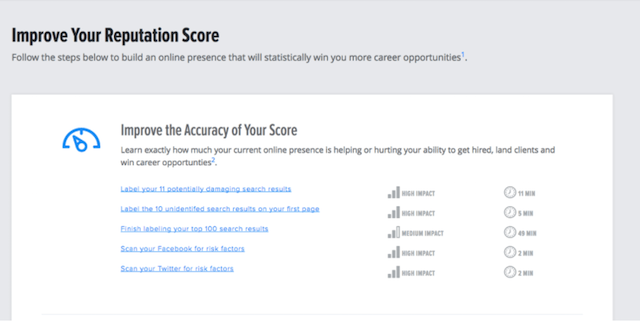Advanced Guide to Fixing Negative Search Results
Summary: In this guide, we cover how to use BrandYourself to combat negative search results that are ranking for your name in Google.<
Dealing with negative search results ranking for your name can have damaging effects on your career and your personal life. In this guide, we cover how to use BrandYourself to combat any negative results with a positive online reputation that wins you career opportunities. We'll also dive into unique situations in which removal is an option.
Suppressing negative results with BrandYourself
Your best option for dealing with negative results is to suppress them with positive, relevant content about you. This is not only a long-term strategy for success, but also safeguards your online reputation from something negative popping up in the future. Our Premium Do-It-Yourself Software walks you step by step through this process and ensures you are doing everything necessary to suppress negative content in search results. The free version of our tool is excellent for monitoring the web for risky information about you in search results and social media, but our Premium tool will guide you through building the online presence you need to suppress damaging and unwanted search results
Why can't you just remove negative results? Removing information that you don't control from the Internet is incredibly difficult and unless you find yourself in one of these unique situations, removal is a challenging process that won't necessarily end in your favor. We'll cover some removal options at the end of this guide, but let's focus on your best option right now: suppression.

Know what's out there
Before mounting your counter-attack, make sure that you know what’s out there about you online. Instead of just reacting, take a full scan of what results come up for your name so that you're aware of exactly what’s hurting you and what you can leverage to help you. Our tool scans the top 100 search results for your name and immediately flags any results that are potentially negative. We also monitor your search results over time so that you’re not caught off-guard by any changes or new negative results.
The Most Effective Way to Deal With Negative Results
When it comes to reacting to existing negative search results for your name, we suggest a combination of tactics.
Get rid of everything you can. It’s amazing how often we shoot ourselves in the foot with what we post or leave up online. Whether you delete an old Facebook post or follow another tactic from our, "Advanced Guide to Fixing Negative Search Results", de-index, delete or remove whatever you can when appropriate.
Create a strong personal brand. Personal branding serves the double duty of suppressing irrelevant or damaging search results while creating an online presence that opens doors for you. Suppressing a negative link with positive content is the best long-term strategy to minimize the effects of the undesirable result - especially in light of Google's recent removal policy updates! Suppression is also the best way to safeguard your online presence from something negative climbing the ranks in the future. Start by building a strong foundation of optimized websites and profiles.
Maintain, monitor and expand your personal brand. Once you’ve built properties for your personal brand, you have to continuously update them and monitor your overall online presence.
To build a strong personal brand:
BrandYourself’s 3 Pillars of a Strong Personal Brand show you the best way to create a successful brand that wins you opportunities and reduces the chances of anyone seeing your negative search results.

- Pillar 1: Building a basic brand
- Pillar 2: Building credibility & an audience
- Pillar 3: Targeting opportunities
Pillar 1: Building a basic brand
In order to build the strongest personal brand possible, we recommend that you follow these steps:
Audit: BrandYourself's DIY software is made to audit any potentially damaging search results, images or social posts that could cost you professional opportunities.
Clean up: Once you know what you're working with, our software helps you delete damaging content that you control. Focus on scrubbing any content that doesn’t fit your desired image.
Define yourself: Now that you've cleaned up any posts, comments or images that you can, it's time to focus on actually building your personal brand. Make sure that you visit our guide on, Personal Branding to learn more about this process.
Build: an online presence that reflects your brand and expertise. This means building a foundation of personal websites and professional profiles. Our software provides an action plan tailored to your industry and unique situation that outlines which properties to build and how to set them up so they are impressive to anyone looking you up.
Follow a personal branding strategy: Follow a plan that makes sense for your particular situation to build a personal brand that accomplishes your goals. Make sure that you stick to your timelines, and engage regularly. Your action plan will help you stay on top of this strategy.
Pillar 2: Building credibility & an audience
Build Credibility through placements Use your personal brand to start getting credible placements in relevant third party publications and channels to get your content syndicated. This shows others (and search engines) that you are relevant and knowledgeable. Publishing on well-respected, and high quality platforms helps establish this kind of credibility.
Start building a relevant audience of “opportunity gatekeepers” Focus on key social media platforms and publications to connect with thought leaders, influencers, and followers in your industry.
Pillar 3: Targeting Opportunities
Leverage your personal brand for new opportunities. A strong personal brand can deliver professional opportunities in the following ways:
- Speaking gigs
- Jobs
- Partnerships
- Blog exchanges
- Interviews
- Mentorships
- Promotions
To learn more about personal branding, visit our guide, "Building a Strong Personal Brand"
There is no overnight fix when dealing with a negative search result, creating a strong foundation and following a disciplined approach to improving your online reputation is your best defense.
Additional Removal Options
Delete. Delete. Delete?
If you want to remove search results, it's going to cost you. In addition to the financial burden, the process is often labor intensive and not guaranteed to work. However, every situation is different, so review the information below to see the likelihood that you can successfully remove negative search results.
Ask for content to be taken down
If you need to remove search results attached to your name, the first option to consider is just asking. In order to request that the content be taken down, you need the contact information of the person who owns the content and/or the domain. You can find this information using a tool like who.is.
Once you have the contact info, send a polite, well-thought out email to the content owner with your request and why you wish to have it removed.
For larger sites, check to see if the content violates the site's Terms of Service and, if so, include that in your email. A few things to keep in mind:
- They don't have to remove it
- Even if the information is removed from the site, this doesn't prevent it from popping up on a different website or being visible through cached searches.
File a request with Google to have the negative search results removed
In some instances, Google will remove information from its search results if it violates copyright law or creates significant risks of identity theft, financial fraud, or other specific harms. This includes national identification numbers, bank account numbers, credit card numbers, images of signatures and nude or sexually explicit images shared without a person's consent. Keep in mind, Google won't remove something simply because your name is in it and you don't agree with what it says about you.
If you think your situation falls within one of these categories, check Google's Removal Policy:
It's important to note that even if your situation falls within these categories, the offending information could still pop up elsewhere, and this won't be an immediate win.
File a DMCA takedown
The Digital Millennium Copyright Act serves to protect copyrighted information on the web. If you're the copyright owner of the negative content, like an image, you can file a DMCA takedown request to have it removed. To do so, you must be the copyright owner and able to prove it.
What if I live in the EU?
The European Union's "Right to be Forgotten" dictates that people have the right to have outdated and irrelevant information on the web about them removed. If you live in the EU or Argentina, you can file a removal request.
Takedown Requests likely to be approved in the EU and Argentina include:
- Outdated information about past events
- Copyrighted property
- Personal identification numbers & info
- Credit card numbers
A few examples of what HAS been removed from the search results of individuals under this ruling:
- An article about a person's conviction for a serious crime which was later quashed on appeal (requested by the individual).
- A link to an article about a political activist who was stabbed at a protest (requested by the victim).
- A news story about a teacher convicted of a minor crime over 10 years ago (requested by the teacher).
- A search result showing a woman's address (requested by the woman).
Takedown Requests not likely to be approved in the EU and Argentina include:
- Recent criminal records & mugshots
- Unflattering images
- Recently written articles that are not in your favor
A few examples of individual requests that HAVE NOT been removed under this ruling:
- A request from a high ranking public official who wanted a recent article discussing a decades-old criminal conviction removed.
- A prominent business person who requested the removal of articles about his lawsuit against a newspaper.
- A priest convicted for possession of child sexual abuse imagery requested the removal of articles reporting on his sentence and banishment from the church.
What if my situation is a case of revenge porn?
Recently, Google announced that it would remove instances of revenge porn: nude or explicit images that are posted to the web without the person's consent. If you fall under this category, you can file a removal request.
Removal doesn't replace the need for a positive online presence
Bottom line, you should be building and maintaining a positive online presence. Even if your situation fits within one of the scenarios outlined above and you're able to get the offending result removed from one site, it does not prevent it from showing up on another site tomorrow - or an entirely new negative result from surfacing in the future. Additionally, Google has been cracking down on court ordered removal requests and honoring less of them in recent months.
The best way to mitigate the effects of your current negative result and safeguard your online reputation from something damaging popping up is to be actively maintaining a positive online presence. This not only is your best option for dealing with negative search results, but having a positive online reputation helps you to win career opportunities.
Frequently Asked Questions
How long will burying a result take?
Negative results can take several months to over a year and beyond to suppress off of the first page. A number of factors can influence this, including; how authoritative the negative is, the number of negative results ranking for your name, how competitive your name is and more.
My negative result is 10 years old but it is still ranking #1 - why is that?
A number of factors can contribute to this, but the most common is that the negative comes from a site that has a lot of authority within Google.
It's likely that your undesirable result resides on a news site, a .gov, a review site or something similar.
This means that it will take a lot of time and hard work for the positive content you create to gain enough authority to suppress the unwanted result.
As long as the negative result isn't actively being updated then, over time, you will see a lot of positive movement in the properties that you do control.
What if I'm trying to bury an image?
Suppressing an unwanted image demands the same 3-step process as suppressing a web result, but with a heavier focus on image content and profiles that rely on images.
Learn more about it in our post, How to Fight an Unwanted Negative Image on Google.
How can BrandYourself help?
Software Features That Matter:
When it comes to dealing with negative results, BrandYourself’s DIY reputation management software helps you identify and monitor them. It also shows you the steps necessary to improve your overall personal brand. In terms of your go-to features on the DIY software, we recommend the following:
Reputation Builder: Review and delete the Social Posts and Images that may be holding you back.

Google Visibility: Mark all of your search results as “Positive”, “Not me” or “Negative”

Once you’ve identified negative search results, build your Personal Brand using the Reputation Builder.

- Personal Brand Action Plan: Follow the highest impact steps you can take to build your personal brand and suppress negative results.If you're dealing with a negative result, you have a few options. If you have the time to work on this consistently, we suggest that you use our Premium DIY tool.
If you don’t have much time to consistently work on improving your online reputation, then we highly recommend that you give us a call at 646.863.8226 or schedule a free consultation. Our Reputation Advisor will take a look at the negative result(s) and discuss the best options for your goals.
Unfortunately, there is no overnight fix when it comes to combating a negative search result. However, creating a strong foundation and following a disciplined approach to improving your online reputation is your best defense.
→